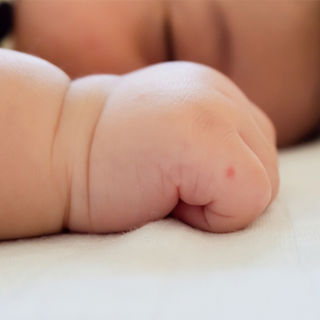
When your baby sleeps well, you get to sleep well too. But the truth is that babies, especially newborns can have pretty unpredictable sleep patterns and a range of other sleep issues. So, here are some common baby sleep problems and how you can tackle them.
1. What is the right time to put baby to sleep at night?
Although there is no one time that works for all babies, try and fix an early bedtime for your little one. Based on your routine, this could be anytime between 6.30 pm to 8 pm, usually once the sun has set. Once you have picked a time, try and keep it consistent. It also helps to pick a bedtime at which you know that your baby usually begins to doze off. Sometimes, your baby may not show any signs of being sleepy. In fact, it might be quite the opposite. He might be active, hyper or playful. This doesn’t necessarily mean that your baby is not ready to go to sleep yet. A lot of parents may misinterpret this behaviour and put their babies to sleep later. When your baby stays up longer than usual, he might get overstimulated and overtired, which leads to this hyper behaviour. If your baby has now got used to staying awake later, simply try putting baby to sleep 15 minutes earlier than his usual time and gradually increase this in increments until you reach an ideal bedtime.
2. My baby only falls asleep when someone is holding/rocking him. How do I make my baby sleep on his own?
Your baby falls asleep in your arms because he finds this to be soothing. For your baby to begin sleeping on his own, he needs to either start learning to self-soothe or you need to figure out another technique that helps soothe him. Now, as newborns cannot really self-soothe, experts suggest that you can begin sleep training once your baby is around 5-6 months of age. However, you don’t have to wait that long to try and encourage good sleeping habits. Here are a few things you can do to try and help your baby to start falling asleep without having to be held/rocked every time:
-Your baby needs to learn to fall asleep in a place other than your arms. This should ideally be his crib. So, instead of waiting until your baby falls asleep before placing him in the crib, rock your little one for a bit and as soon as you see that he is getting drowsy, place him in the crib. If he starts crying, pick him up and try it again.
- The key to teaching any new habits is consistency. So, while a technique may not necessarily work the first few times, if you implement it consistently, you will most likely see results within a week or so. - A lot of parents use white noise machines to help put their babies to sleep. Place your baby in the crib, switch on the machine and sit beside him until he falls asleep. Again, if you’re going to try using a white noise machine, you need to use it consistently for a while to see any results.
- Get creative. As no two babies are the same, what works for one might not work for another. Keeping your baby’s habits/likes/dislikes in mind, think of soothing techniques that do not involve you having to carry your baby until he falls asleep.
3. My baby tends to sleep through the day and stays awake at night. How do I change this pattern?
Newborns can’t really tell the difference between day and night because their circadian rhythm hasn’t developed properly yet. This is why your baby is not sleeping at night and sleeping longer during the day. So, it’s up to us to set the clock right and help them understand this distinction. If your baby has problems sleeping at night, here are some helpful sleeping tips you can follow to change this:
- Light exposure plays an important role in establishing your baby’s day & night rhythm. In the day time, make sure that there is enough natural light coming into your baby’s room. Sit in a spot with ample day light during feeding or play sessions. Before bed-time, avoid artificial light sources and either switch off or dim the lights before putting baby to bed.
- During the day, keep your baby engaged by including him in your daily activities. Encourage playtime and movement during the day. At bedtime, keep activity to a minimum and try and get your little one to relax. Create a soothing atmosphere.
- A consistent and relaxing bedtime routine can also help your baby wind down and get ready to sleep at night. Set a fixed bedtime. Massage your baby with a calming massage oil or give him a bath before bedtime. Sing him a lullaby or read a story. All these small activities act as cues to let your baby know that it’s time to go to bed.
- When you wake your baby up for a night feed, don’t make eye contact/play/start talking to him. After you’re done changing and feeding him, simply put him back to bed quietly.
All these small habits will slowly help your baby to start making out the difference between day and night, and help him to sleep better at night and stay awake longer during the day.
4. How do you tackle sleep regression in babies?
As your baby grows, his sleep patterns become a little more predictable. However, this can be disrupted if your baby experiences ‘sleep regression’. You’ll notice that your baby’s sleep patterns have suddenly changed or ‘regressed’ and he is waking up more often through the night, refusing to nap or napping for shorter periods. You might also find that he has become excessively cranky and/or you’re finding it harder to put him to bed. More often than not, sleep regression occurs around the 4-month-mark, or at 9 months or 18 months, and it can last from anywhere between 2 to 6 weeks. However, before you conclude that your baby has sleep regression, try and ensure that these changes are not being caused by some kind of illness or teething pain. If you’re sure your baby is undergoing sleep regression, here are some ways you can deal with it.
- It’s okay to be flexible but don’t change your bedtime routine. Keep following the same pre-bedtime rituals that your baby is accustomed to and tweak it slightly, if necessary.
- Your baby might have regressed to his previous sleep behaviour, but that doesn’t mean you should regress to using the earlier sleep methods that your baby has outgrown, such as rocking your baby to sleep or walking around with him. This can cause your baby to fall back into old habits and associations, which will then be much harder to break. Instead, soothe your baby through other means. If your baby seems to be soothed by a pacified or white noise machine, try those instead.
- During sleep regression, your baby will most likely get a loss less sleep than usual – this lack of sleep can cause them to become cranky and fussy. So, try and increase the frequency of naps, whenever possible, even if your baby is sleeping for shorter periods. Anytime that you notice your baby is drowsy or showing signs of sleepiness, take him to a quiet space and try and put him to sleep.
- Sometimes, parents may misinterpret baby’s refusal to sleep/crankiness as a sign that they are hungry. While this may be true at times, it is not always the case. As sleep regression usually occurs when your baby is going through a new developmental stage, your baby’s sleeplessness is mostly spurred by over alertness and brain activity, not hunger. However, trust your instincts and if you do feel that your baby is hungry, feeding your little one can help calm them down. That said, it helps if you ensure that baby has had a good satisfying feed before you put them to sleep at night.
- If your baby is younger, he might find it comforting to be swaddled at night. Similarly, a bath or a calming massage before bedtime can also help baby relax.
- Try and remember that this is not a permanent change and your baby’s sleep patterns will regularize soon. Create a calm atmosphere and provide lots of cuddles & kisses. If you get frustrated often, this feeling can rub off on your baby as well.
5. My baby becomes totally alert after her night feed and it’s hard to put her back to bed. How do I help her go back to sleep after a night feed?
As discussed above, young babies can’t really distinguish between day and night and so, we need to help them out a little. To put it simply, she needs to learn that daytime is for play and other activities, whereas nighttime is for sleep. Next time your baby wakes for a night feed, gently lift her out of her crib without making any eye contact. Keep the lights very dim and avoid making any loud sounds. Don’t engage with your baby or talk to her. Just follow the drill and once you’re done feeding, changing and burping, put her back in her crib. Note – if you don’t necessarily have to change your baby’s diaper at that point, avoid it and put her back to bed. Don’t walk around burping her for too long either. Keep the atmosphere as calm and soothing as possible so that she drifts back to sleep easily.
Got any more baby sleep-related questions? Leave a comment below and we’ll answer your question in our next blog.



















